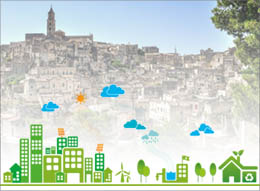Sustainability: Matera Green Capital of Culture
28/4/2016
Making sustainable and energy efficient the urban fabric of Matera, awarded European Capital of Culture 2019, through interventions in the areas of mobility, technologies for energy production from alternative sources and energy efficiency. This is the objective of a Memorandum of Understanding signed by ENEA, the Consortium TRAIN and the Matera Municipality.
 Making sustainable and energy efficient the urban fabric of Matera, awarded European Capital of Culture 2019, through interventions in the areas of mobility, technologies for energy production from alternative sources and energy efficiency. This is the objective of a Memorandum of Understanding signed by ENEA, the Consortium TRAIN and the Matera Municipality, foreseeing the promotion of electric vehicles in local public transportation, the improvement of energy efficiency in the lighting system and public buildings and the development of incentives for environmentally sustainable private transportation.
Making sustainable and energy efficient the urban fabric of Matera, awarded European Capital of Culture 2019, through interventions in the areas of mobility, technologies for energy production from alternative sources and energy efficiency. This is the objective of a Memorandum of Understanding signed by ENEA, the Consortium TRAIN and the Matera Municipality, foreseeing the promotion of electric vehicles in local public transportation, the improvement of energy efficiency in the lighting system and public buildings and the development of incentives for environmentally sustainable private transportation.
In order to meet these objectives and make Matera a model sustainable city, ENEA has committed to deploy its technological skills and solutions in the fields of renewable energy sources (photovoltaics, bio-energy, solar thermal and thermodynamic), energy efficiency, smart city, solar cooling, accumulation of electricity for mobile and stationary applications and smart grid.
“The choice of Matera as European Capital of Culture 2019 – Giampiero Celata, Head of the ENEA Energy Technologies Department, pointed out- must be an opportunity to make Matera an example of best practice, improve the quality of life of its citizens and promote stable economic development and employement, making transportation, energy consumption and social services increasingly efficient”.
TRAIN is a not-for-profit Consortium, of which ENEA holds a 55.37% financial stake, aimed at promoting technological R&D activities in the energy, transportation, logististics and ICT fields, particularly in the Southern Italy regions.
For more information please contact:
Gian Piero Celata, Casaccia Research Center, gianpiero.celata@enea.it
